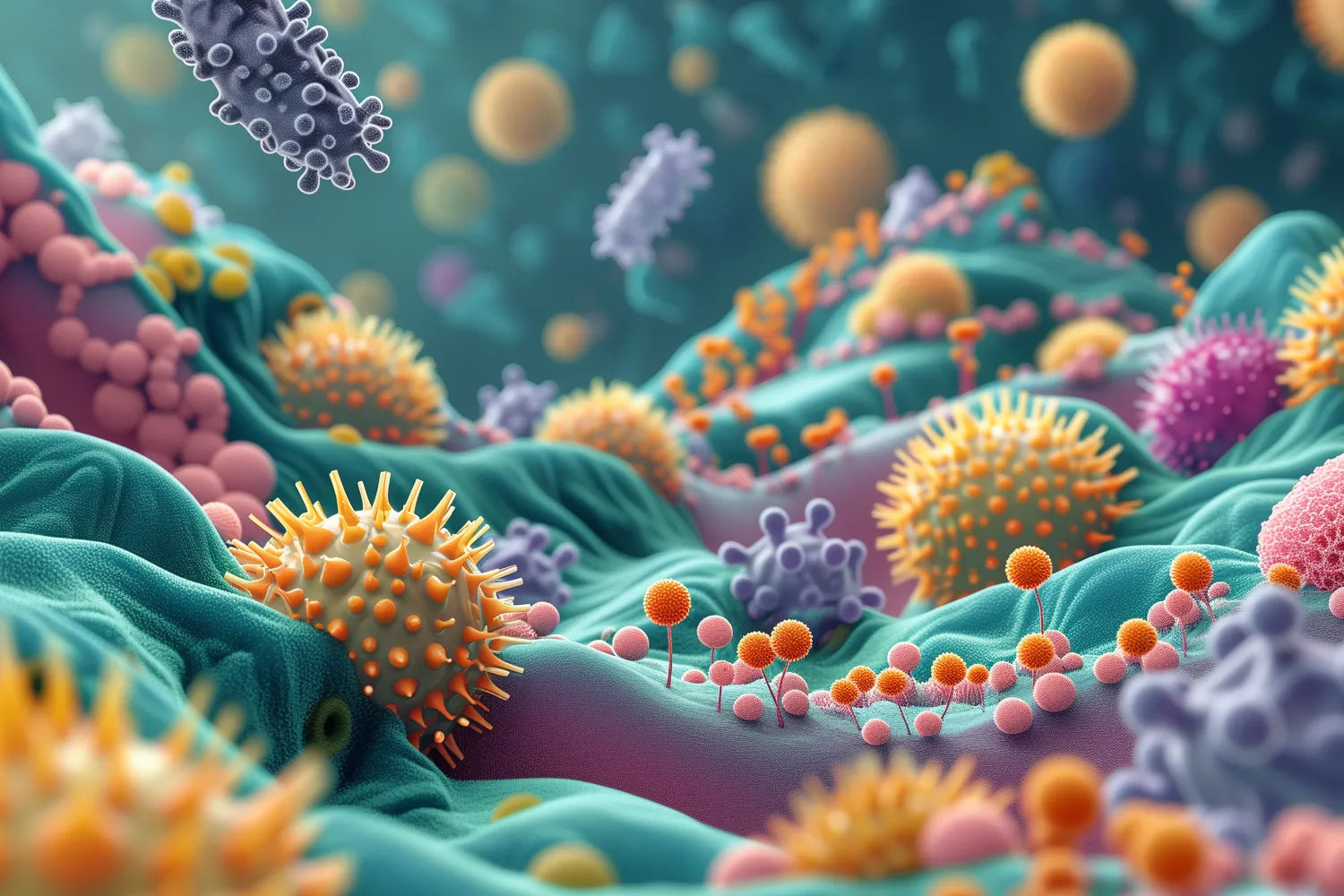
Dr. Eric Venn-Watson’s Highlights
Everyone can appreciate a great head of hair. Thick, full locks are seen as a symbol of not only youthfulness, but of health and wellness. When your body is healthy, your hair often reflects that by being lustrous. Hair that is brittle, dull, and lifeless can often be a symptom of an underlying medical condition, vitamin deficiency, or malnourishment.
If you’re looking for a way to boost your hair’s volume and increase shine, you’ve probably already started considering supplements. Here, we’ll cover five of the top most popular supplements for supporting healthy hair, including one essential fatty acid that might just be the key to your healthiest hair yet.
But first, we’ll talk about the anatomy of our hair and what makes it grow healthfully.
The Anatomy of Hair
Your hair isn’t made of living cells. The cells that form your strands of hair are actually dead. They are living when they are underneath your scalp, but once they have broken through the surface and are visible, the strands of hair are made of dead cells.
Keratin
The most abundant protein in your hair is keratin. Keratin is a tough protein that protects the hair follicle and keeps your hair from becoming brittle and breaking. Keratin is essential for hair growth, but getting keratin in a topical form (like in a shampoo) has limited evidence of being beneficial to your hair’s health and growth.
The Hair Growth Cycle
Your hair grows in a constant cycle, and each hair is on a separate schedule and cycle from other hairs. This ensures you don’t lose all your hair at once! Hair grows through the hair follicle and is lubricated by sebaceous glands in the follicle that keep it hydrated and smooth with sebum.
Sebum also helps keep your scalp hydrated and protected. The four phases of hair growth are anagen, catagen, telogen, and exogen.
-
Anagen. The anagen phase of your hair’s cycle is the growth phase. During this phase, which can last between four to ten weeks (or longer depending on the person), keratin is produced and the base of the hair shaft is constructed.
-
Catagen. Once your hair has finished the anagen phase, it reaches the catagen phase. During the catagen phase, the hair officially stops growing. The follicle where the hair is located begins to shrink, and blood is no longer supplied to the hair. As such, the source of nutrients and red blood cells being supplied to your hair is officially cut off.
- Telogen. The telogen phase is also known as the “rest” phase of hair growth. Once the hair has transitioned through the catagen phase, it remains dormant in the telogen phase. During this phase, the hair doesn’t grow, it isn’t supplied with blood flow, doesn’t receive any nutrients, and doesn’t really change. Although the hair isn’t yet ready to fall out, no new growth happens in this phase. Most of the hair on your head is likely in the telogen phase of growth. Your hair will remain in the telogen phase for months at a time.
-
Catagen. Once your hair has finished the anagen phase, it reaches the catagen phase. During the catagen phase, the hair officially stops growing. The follicle where the hair is located begins to shrink, and blood is no longer supplied to the hair. As such, the source of nutrients and red blood cells being supplied to your hair is officially cut off.
- Exogen. The exogen phase is the final life cycle phase of your hair. During the exogen phase, the hair follicle widens allowing the hair to be released and fall out. Normally, a new hair replaces the old one at the base of the hair follicle. The new hair will enter the anagen phase.
Your hair is constantly cycling through the phases of growth, and taking supplements can help encourage healthful hair growth and development.
Five Supplements for Health Hair
Your hair health starts at the cellular level, and ensuring the cells that control hair growth are healthy will naturally lead to healthier, shinier hair.
Here are five supplements commonly used to support hair growth and health.
1. Vitamin A
Vitamin A is an essential vitamin, which means your body needs it to function properly but cannot make it on its own. As such, you must get it from your diet. Vitamin A is essential for cell growth and repair. It’s also a crucial component of sebum, the natural oil on your scalp.
Vitamin A deficiency can lead to brittle hair, hair breakage, and even hair loss. Most people get enough vitamin A through their diets, but a blood panel can determine if you are deficient. It’s important to get the right amount of vitamin A, also — too much vitamin A has been associated with alopecia (i.e. hair loss) as well as a risk for seizures, headache, and blurred vision, among others.
2. Biotin
If there was a popularity contest for hair supplements, biotin would take home the gold. Biotin is on the ingredients list for everything that claims to support hair health, from shampoo to hairspray to vitamins, with the claim that using these products will help promote hair growth and make hair fuller.
Biotin is vitamin B7, and is sometimes known as vitamin H. It helps stimulate the production of keratin, which as we discussed is the essential building block of new hair, as well as maintaining your skin and nails. However, there’s a lack of scientific evidence that taking biotin will cause you to produce more keratin and thus, longer hair. That said, it may be helpful if you’re dealing with a biotin deficiency, which may be the cause of weakened hair.
If you are deficient in biotin, you may experience hair loss or hair thinning. If you aren’t deficient, taking biotin may not yield any noticeable results in your hair.
3. Vitamins C and E
Vitamins C and E are powerful antioxidants that can be useful in preventing damage to your hair and scalp. Free radical damage is caused by unbalanced molecules that attack your cells and cause them to become damaged.
Free radicals come from sources like pollution, cigarette smoke, alcohol, UV rays, and even just everyday biological processes inside your body. Vitamins C and E (and even some minerals like zinc) are antioxidants that act like a shield to protect your cells from oxidation. Additionally, vitamin C is necessary for the production of collagen, another protein found abundantly in your hair.
4. Vitamin D
Vitamin D is thought to play a role in hair growth, but the focus of research has been mostly on how vitamin D receptors affect the hair growth cycle. These receptors seem to be important, especially for patients with alopecia, a sudden loss of hair that can be unexplainable.
Both consumption of Vitamin D in our diets and expose to the sun (UVB radiation) is required to maintain adequate levels in our serum.
5. C15:0 (Pentadecanoic Acid)
The essential problem all of the aforementioned supplements have is that unless you are deficient in them, taking them may not make an impact on your hair.
The hair you see coming out of your head is actually dead, but the follicles they come out of are very much living cells that need maintenance and support, and they can get that with C15:0.*
C15:0 has been found to nourish hair and support its growth, reduce inflammation often associated with hair loss, and result in thicker and healthier hair.*
C15:0, also known as pentadecanoic acid, is an essential, odd-chain, saturated fatty acid discovered by a veterinarian epidemiologist while studying health and longevity in geriatric dolphins. Dr. Venn-Watson and her team discovered that dolphins who lived longer and had less age-related illnesses had higher circulating levels of this fatty acid in their bodies.
Over 24 peer-reviewed publications in 2021 alone were published describing the benefits of C15:0 to our health — just like vitamins and essential fatty acids, your body needs C15:0 to function properly.
Found in trace amounts in whole fat dairy products, it’s nearly impossible to get the amount of C15:0 you need from food without also getting the extra calories, sugar, and even-chain “bad” fatty acids that come with it,
Thankfully, there’s fatty15.
Elevate your cells. Elevate your self.
Fatty15 for Healthy Hair
Fatty15 is the first and only supplement to contain FA15™, the pure, vegan-friendly, sustainably sourced, version of C15:0.
Fatty15 supports your cells (and thus the health of your hair) in three important ways:*
-
Increased mitochondrial function. Your cells are powered by mitochondria. As we get older, mitochondrial functions declines, making it harder for our cells to carry out important processes, and making us feel tired and out of fuel before the day is through.
Fatty15 increases mitochondrial function by up to 45%, helping our cells get the fuel they need to perform their best.
-
Strengthening cell membranes. Your cells are protected by their membranes. Over time, cell membranes weaken, leaving your cells susceptible to external stressors. Fatty15 is a sturdy fatty acid that integrates itself into your cell membranes to fortify them, giving your cells the protection they need.
- Improved cellular signaling. By activating receptors all over your body, fatty15 can help regulate processes like mood, immunity, sleep, and even appetite.
By caring for your cells, you’ll be setting the tone for your hair to grow as healthfully as possible in ways that other supplements can’t.*
Get Fatty
If it’s healthy hair you want, it’s healthy cells you need. Take care of your hair (and your entire body) by investing in your cellular health. Fatty15 supports your cells and gives you the ability to keep them healthier, longer, and you can get started with our 30-day trial kit here.*
Sources:
Definition of keratin - NCI Dictionary of Cancer Terms
What is the structure of hair and how does it grow? - InformedHealth.org - NCBI Bookshelf
Hyena Disease in Calves Due to Overdose of Vitamin A|PubMed
Reviewed by Eric Venn-Watson, MD, MBA.

Eric Venn-Watson M.D.
CEO, Co-Founder
Senior Scientist, Co-Founder
Eric is a physician, U.S. Navy veteran, and Co-founder and COO of Seraphina Therapeutics. Eric served over 25 years as a Navy and Marine Corps physician, working with the special forces community to improve their health and fitness. Seraphina Therapeutics is a health and wellness company dedicated to advancing global health through the discovery of essential fatty acids and micronutrient therapeutics.
You May Also Like...
10 Foods Good for Your Liver: The Ultimate Guide
Your liver does a lot for you. If it had a voice of its own, it might ask you to eat more veggies and cut back on your Old Fashioneds. Unfortunately, the liver doesn’t receive a lot of attention until...
How To Improve Your Gut Microbiome: 6 Tips
Interested in how to improve your gut microbiome? We’ve got six tips to help your gut thrive and improve your overall digestion.


